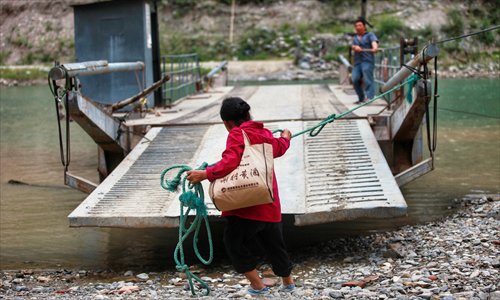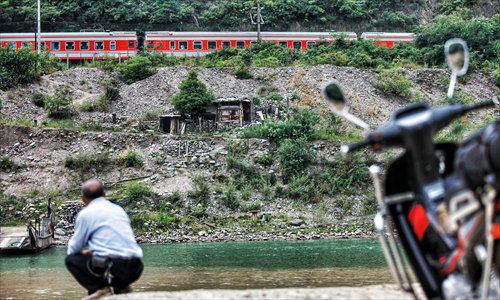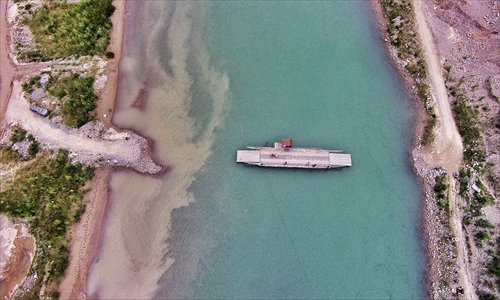HOME >> CHINA
Pulling on the river
Source:Global Times Published: 2015-8-23 17:53:01

A passenger gets on the boat at the crossing. Photo: CFP

A passenger squats next to the river and looks at a train that runs through the mountains. Taking the train takes an extra two hours compared to the crossing. Photo: CFP

Wei Chengyou pulls the rope to move the boat. Photo: CFP

The river isn't wide at the crossing, but it's still difficult to get across. Photo: CFP

Wei sleeps in a small house on the boat, this way he can be alerted at once if anyone needs to cross. Photo: CFP
Wei Chengyou is the only working boatman left at the Heyeba crossing on the Jialing River.
Before May, his 71-year-old father, Wei Xuming was the only boatman. But after he was weakened by an illness, his son took over the crossing.
The crossing has existed since the 1950s. Back then, the boat was made of wood. Now those who wish to cross the river do so in a steel boat.
A rope reaches across the river. The boatman stands on the head of the boat, and pulls on the rope, until slowly the boat floats to the opposite bank.
The village of Heyeba, in Hanzhong, Northwest China's Shaanxi Province, has about 1,000 people, and people from two other villages also use the crossing, bringing the number to 3,000.
Wei Chengyou said he charges a person one yuan ($0.16) for a round trip. The crossing is popular, because it saves people around two hours of riding in train. If the crossing didn't exist, people would need to travel around a mountain to reach the nearby town.
This ancient method of crossing rivers has appeared in classic novels. A novel published in 1934, Border Town, by famous writer Shen Congwen featured a young woman living in a small city whose grandfather is a boatman.
But while that book was set in the 1930s, there are boatmen on many rivers in China even now.
Heyeba's village secretary of the Communist Party of China, Jia Xingfu, told media he has advised higher-level governments to build a bridge at the crossing, but for some reason, they have declined to do so.
It's quite dangerous at the crossing, especially during flood season from June to September. Accidents occasionally happen; people have fallen into the river, even when they were sitting on the boats.
In the township, there are seven crossings. For the foreseeable future, people in that area will still need to rely on boatmen to cross the river.
Posted in: In-Depth